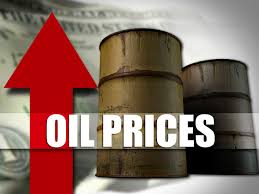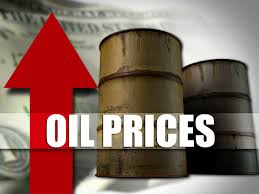
After OPEC agreed to cut crude output to clear a glut, oil swept to a six-week high on Thursday, lifting energy shares in its slipstream. On the other hand, on prospects that resulting inflationary pressures will lead to higher interest rates, there was a rise in bond yields.
On Wednesday, finally taking action after global oil prices fell by more than half in the last two years, the Organization of the Petroleum Exporting Countries agreed to its first output cut since 2008.
For the first time in 15 years, non-OPEC Russia will also join output reductions.
For the first time since October, U.S. crude oil CLc1 added to overnight gains of 9 percent to reach $50.00 a barrel.
on prospects that president-elect Donald Trump would adopt reflationary policies using a large fiscal stimulus, the inflation expectations in the United States were already rising and the jump in oil prices added to the expectations.
With yields pushing higher, especially on longer-dated bonds, the rout in U.S. Treasuries resumed as a result. There was a rise 3 basis points to 2.40 percent and 3.06 percent, respectively, in the yield on 10-year and 30-year bonds, which are most sensitive to inflation eroding their value.
"Higher oil prices, talk of ultra-long issuance in the U.S. and strong U.S. data all helped push U.S. yields higher," RBC Capital markets said in a note to clients on Thursday.
"This remains our key theme for next year as well – we believe U.S. yields will keep leading the charge higher on improving macro backdrop and rising inflation expectations."
Heading back towards a 14-month peak of 3.09 percent marked last week, the 30-year yield has climbed more than 40 basis points since the Nov. 8 presidential election.
The 10-year yield had its biggest monthly rise in November since 2009. According to Bank of America Merrill Lynch data, since the Nov. 8 U.S. election, bonds across the world lost about $2 trillion in market value.
Whether the OPEC deal will hold together is what the investors are now looking at. It was expected to have a broad implication on the global economy if the bounce in oil prices gathers pace after the OPEC deal.
Brent is still less than half of where they were in 2014 but is off the 12-year low of $27 per barrel marked in January.
While potentially easing deflationary pressures in developed economies locked in a battle against falling prices, economists expect a further recovery in crude to bode well for oil-exporting economies.
Rivals to the oil cartel, a boon for U.S. shale producers is also expected following the OPEC's output cut. The S&P energy index jumped nearly 5 percent on Wednesday.
"The question is whether this (production cut) is going to put a floor under the oil price from here. The answer to that could well depend on what happens with the global economy in the coming year," said Simon Smith, chief economist at FXPro.
(Source:www.reutrs.com)
On Wednesday, finally taking action after global oil prices fell by more than half in the last two years, the Organization of the Petroleum Exporting Countries agreed to its first output cut since 2008.
For the first time in 15 years, non-OPEC Russia will also join output reductions.
For the first time since October, U.S. crude oil CLc1 added to overnight gains of 9 percent to reach $50.00 a barrel.
on prospects that president-elect Donald Trump would adopt reflationary policies using a large fiscal stimulus, the inflation expectations in the United States were already rising and the jump in oil prices added to the expectations.
With yields pushing higher, especially on longer-dated bonds, the rout in U.S. Treasuries resumed as a result. There was a rise 3 basis points to 2.40 percent and 3.06 percent, respectively, in the yield on 10-year and 30-year bonds, which are most sensitive to inflation eroding their value.
"Higher oil prices, talk of ultra-long issuance in the U.S. and strong U.S. data all helped push U.S. yields higher," RBC Capital markets said in a note to clients on Thursday.
"This remains our key theme for next year as well – we believe U.S. yields will keep leading the charge higher on improving macro backdrop and rising inflation expectations."
Heading back towards a 14-month peak of 3.09 percent marked last week, the 30-year yield has climbed more than 40 basis points since the Nov. 8 presidential election.
The 10-year yield had its biggest monthly rise in November since 2009. According to Bank of America Merrill Lynch data, since the Nov. 8 U.S. election, bonds across the world lost about $2 trillion in market value.
Whether the OPEC deal will hold together is what the investors are now looking at. It was expected to have a broad implication on the global economy if the bounce in oil prices gathers pace after the OPEC deal.
Brent is still less than half of where they were in 2014 but is off the 12-year low of $27 per barrel marked in January.
While potentially easing deflationary pressures in developed economies locked in a battle against falling prices, economists expect a further recovery in crude to bode well for oil-exporting economies.
Rivals to the oil cartel, a boon for U.S. shale producers is also expected following the OPEC's output cut. The S&P energy index jumped nearly 5 percent on Wednesday.
"The question is whether this (production cut) is going to put a floor under the oil price from here. The answer to that could well depend on what happens with the global economy in the coming year," said Simon Smith, chief economist at FXPro.
(Source:www.reutrs.com)














